Learning from Violation Cases of Influencer Advertising: Responding to Strengthened Regulations Against Stealth Marketing

In recent years, the proliferation of social media has led to the rise of influencer marketing. However, alongside this trend, the practice of ‘stealth marketing’—promoting products or services without disclosing that the content is sponsored—has come under scrutiny. As a result, regulations under the Japanese Act against Unjustifiable Premiums and Misleading Representations have been strengthened.
This article will introduce two cases of violations that received administrative orders from the Japanese Consumer Affairs Agency after the reinforcement of stealth marketing regulations in October of Reiwa 5 (2023). Additionally, we will provide insights into important considerations that companies should be aware of when engaging in influencer marketing.
The Background of the Premiums Display Act Amendment and the Strengthening of Stealth Marketing Regulations
While many companies employ influencers for advertising, there has been a surge in cases where ‘stealth marketing’ has misled consumers. Here, we will explain the background of how stealth marketing came to be regulated.
What is Stealth Marketing?
Stealth marketing (hereinafter referred to as ‘stealth marketing’) refers to advertisements that are disguised as non-advertisements, where celebrities or influencers act as if they are neutral third parties to promote or introduce products or services, or where advertisers receive compensation from businesses and post favorable comments or reviews pretending to be ordinary consumers.
In the past, the Japanese Premiums Display Act could not regulate stealth marketing unless it fell under the category of superior misrepresentation (Article 5, Item 1) or advantageous misrepresentation (the same, Item 2). In this context, Japan was pointed out as a ‘stealth marketing paradise’ compared to the EU and the United States, where stealth marketing regulations already existed.
Due to such circumstances, on March 28 of Reiwa 5 (2023), stealth marketing regulations were established in Japan as well. The “Notice Regarding Displays Difficult for General Consumers to Identify as Business Advertisements” (Cabinet Office Notice No. 19, hereinafter referred to as ‘Stealth Marketing Notice’) and the “Operational Standards for Displays Difficult for General Consumers to Identify as Business Advertisements” (hereinafter referred to as ‘Operational Standards’) were set, and they were enforced on October 1 of the same year.
Mandatory Disclosure of ‘Advertisements’ Due to Strengthened Stealth Marketing Regulations
According to the Operational Standards, the Stealth Marketing Notice defines stealth marketing as “displays made by a business regarding the transaction of goods or services it supplies, which are recognized as difficult for general consumers to identify as such.”
If the following two criteria are met, it may be judged as stealth marketing:
- The display is regarding the transaction of goods or services, and the entity making the display is the business providing the goods or services itself.
- It is difficult for general consumers to discern that the display is made by the business.
For more details on the Premiums Display Act amendment of Reiwa 5 (2023) October, please refer to the following.
Related article: Mandatory Disclosure of ‘Advertisements’ Starting October Reiwa 5 (2023). Explaining the Operational Standards for Stealth Marketing Regulations[ja]
Two Case Studies of Enforcement Actions Following the Strengthening of Stealth Marketing Regulations

Here, we introduce two enforcement actions issued by the Consumer Affairs Agency since the stealth marketing regulations were strengthened in October of Reiwa 5 (2023). Both cases involve the use of influencers in advertising.
Case Study: RIZAP Inc.
On August 9, 2023 (Reiwa 6), the Consumer Affairs Agency issued an administrative order against RIZAP Inc., the operator of “chocoZAP,” for a violation of stealth marketing regulations. The issue arose when influencers, commissioned by the company, posted content on “Instagram” that was subsequently presented on the company’s website as third-party reviews, making it difficult for the general consumer to discern that these were company-sponsored posts.
The influencers posted the following content on “Instagram” at the request of the company:
- “Available 24/7, so you can come anytime,”
- “Great for early mornings or fitting in a session during work breaks, and of course, late at night works too,”
- “Targeting my post-pregnancy belly that hasn’t slimmed down at all – going in circles haha,” and more.
These posts, without clear indication that they were commissioned by a third party, were featured on the “chocoZAP” website under sections like “Customer Testimonials” and “The Talk of SNS! Rave Reviews Coming One After Another.”
It was determined that these representations did not make it sufficiently clear to the general consumer that they were company statements, thus falling under the category of “difficult for the general consumer to discern as a business representation” (as per the stealth marketing notification).
Case Study: Otsuka Pharmaceutical Co., Ltd.

On November 13, Reiwa 6 (2024), the Consumer Affairs Agency imposed administrative sanctions on Otsuka Pharmaceutical Co., Ltd., for violations of stealth marketing regulations. This action was in response to posts made by influencers on ‘Instagram’ at the request of the company, which were also displayed on the company’s online shopping site without proper disclosure.
Influencers commissioned by the company posted the following content on ‘Instagram’:
- “No matter the age, I want to live a vibrant life, feeling that ‘now is the best’!”
- “Domestically produced with thorough management from raw materials to manufacturing!! It’s best to have something you can trust going into your body!”
- “Conveniently packaged in individual servings of three pills per day, it’s hygienic and very handy!”
The company featured these posts on its website without clearly indicating that they were made by a third party at the company’s request, using phrases like “Rising in popularity on Instagram⤴”.
As the company did not disclose that the posts were commissioned and it was not clear to the general consumer that the posts were representations made by the business, the display was deemed to fall under the category of “difficult for the general consumer to discern as a representation by the business” (as per the stealth marketing notification).
Penalties for Stealth Marketing Regulations Under the Japanese Act against Unjustifiable Premiums and Misleading Representations
Violating stealth marketing regulations may result in an order from the Consumer Affairs Agency of Japan (under Article 7 of the Japanese Act against Unjustifiable Premiums and Misleading Representations). Consequently, the name of the business may be published on the agency’s website or other platforms. Furthermore, non-compliance with the order can lead to imprisonment for up to two years or a fine of up to 3 million yen, or both (as per Article 46).
Moreover, when the issuance of an order is made public, it can significantly damage a company’s reputation and image. As demonstrated in the two cases introduced here, the legal and financial repercussions are substantial, not to mention the severe negative impact on the company’s credibility, which has been reported in major newspapers and other media outlets.
The contents of the orders in these two cases can be summarized in three main points:
- Ensure that the general public is fully aware that the representation in question violates the Japanese Act against Unjustifiable Premiums and Misleading Representations.
- Implement measures to prevent recurrence and ensure that they are thoroughly communicated to executives and employees.
- Refrain from making similar representations in the future.
Key Points to Consider in Influencer Marketing
The two cases introduced here both involve marketing using influencers and the issue of how their endorsements are displayed. There were no problems because the influencers appropriately indicated that their posts on social media, etc., were “advertisements”.
However, when the content posted by the influencers was presented on the company’s website as if it were a third-party review, it was deemed difficult for “general consumers to discern that it was a representation by the business,” leading to a corrective order from the Consumer Affairs Agency for stealth marketing.
In other words, even within your own website, treating a “business representation” that you requested to be posted on social media as if it were consumer feedback or reviews constitutes stealth marketing.
It is crucial to ensure that everyone involved in advertisement creation is fully aware of these rules related to the Japanese Prize Display Act (景品表示法). We recommend the creation of internal guidelines and the implementation of regular training sessions to ensure thorough knowledge of the rules and to keep up with any amendments to the law.
Summary: Legal Checks by Attorneys are Essential for Influencer Marketing
Regarding the regulation of stealth marketing, after the enforcement in October of Reiwa 5 (2023), the above two cases have been cracked down on. Not limited to influencer marketing, the Japanese Consumer Affairs Agency has also issued more than ten orders in a short period for claims such as “No. 1 in Satisfaction,” indicating that caution is necessary for representations in advertising and similar areas.
Business operators must consider the operational standards and develop advertisements that comply with stealth marketing regulations. It is essential to incorporate legal checks by attorneys familiar with the Japanese Act against Unjustifiable Premiums and Misleading Representations from the planning stage when creating advertisements.
Guidance on Measures by Our Firm
Monolith Law Office is a law firm with extensive experience in both IT, particularly the internet, and legal matters. In recent years, violations of the Japanese Fair Trade Display Act, such as misleading superior misrepresentations in internet advertising, have become a significant issue, and the need for legal checks is ever-increasing. Our firm provides services such as legal checks for advertisements and landing pages (LPs), and the creation of guidelines, taking into account various legal regulations. Details are provided in the article below.
Areas of expertise at Monolith Law Office: Article and LP checks for compliance with the Japanese Pharmaceuticals and Medical Devices Act, etc[ja].
Category: General Corporate





















